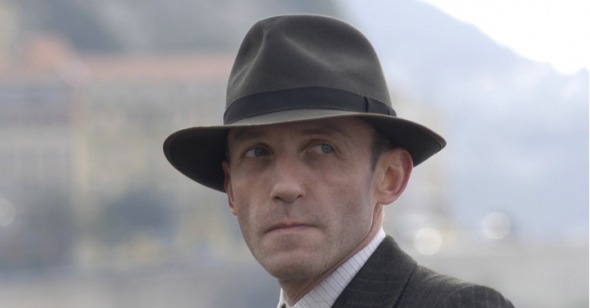Money for Nothing
By Michael Koresky
The Counterfeiters
Dir. Stefan Ruzowitzky, Austria, Sony Pictures Classics
Let’s get it out of the way first: Stefan Ruzowitzky’s The Counterfeiters was nominated for a Best Foreign-Language Film Oscar, controversially at the exclusion of a handful of borderline masterpieces, from Cristian Mungiu’s 4 Months, 3 Weeks, and 2 Days to the upcoming Silent Light and Secret Sunshine. Though it feels disingenuous to bring up the most notoriously boorish, nonsensically designed of all Academy Award categories when discussing a film’s merits, perhaps it’s productive to point out all the reasons why a film such as The Counterfeiters gets that slot over more difficult, rewarding, and harder to categorize films that would need the recognition to make any waves outside of small, cinephilic circles. For The Counterfeiters is the bread and butter of the Academy, not to mention film festival audiences everywhere, and as such, seems to have been designed solely to win plaudits: a Holocaust drama that effectively mixes raw, “realistic” violence with a narrative of moral uplift that prizes individual strengths, inferring that overcoming is possible; a main character who’s just the right, ingratiating mix of stoic and rascally; a litany of latter-day Euro cinema-of-quality clichés predicated upon a central moral conundrum that grants the film its supposed complexity; a German filmmaker grappling with the demons of his own nation and family (Ruzowitzky’s grandparents were Nazi collaborators) and daring to depict the impossible.
The film asks: By agreeing to help fund the German war effort via leading a team of fellow prisoners in producing high-quality counterfeit money, is concentration camp inmate Salomon “Sally” Sorowitsch betraying his own people and sealing his own fate? It’s the type of question that produces narrative tension and critical talking points, yet it also supposes that Russian-Jewish Sally (played by Karl Markovics) had a choice in the matter. So endless conversations between hollow-eyed, crooked faced Markovics and Sally’s fellow camp victims discussing the moral repercussions of such an act feel writerly and calculated, especially for a tale of survival based on true events. Ruzowitzky’s need to spell out his themes for the audience is a constant here: it’s the kind of film where in the opening sequence, prior to the extended flashback that is the bulk of the narrative, a tattered newspaper washes on a craggy shore next to our dazed survivor protagonist, that reads “La Guerre Est Finie!” In case we wouldn’t have caught on.
From there it’s a brief sojourn to a perfunctorily mounted decadent Berlin, where Sally’s squirrelly rapscallion forges ID cards, passports, and cash. It’s only a matter of time before fey, pig-faced German police squad commander Herzog (David Striesow) busts into his attic, devilishly proclaiming, “It is an honor to arrest the world’s best counterfeiter!” So begins a battle of wits between the two men that continues on through his stay at the Sachsenhausen camp, where he’s been handpicked by Herzog to set up an epic operation creating fake pounds (“We intend to flood and destroy Britain’s economy!” Herzog, always on-the-nose, blurts out) and, eventually, dollars. In exchange the prisoners are given the false hopes of comfortable cots, decent food, and, in one morbidly amusing sequence, a ping-pong table, absurdly meant to take their minds off their situation.
Though once Holocaust dramas were considered something of a tough sell, for art-house crowds this genre is the closest thing to a known quantity. And Ruzowitzky’s technique is as predictable as his subject, as he uses a host of unimaginative, often inappropriately aestheticized technical gimmicks, from the immediate shift to grey skies and grainy stock when he cuts to the camps, to the odd little shaky zooms that at random moments connote a forced documentary style. While there doesn’t seem to be a unifying aesthetic, Ruzowitzky stated, in the press notes, that the only dictate he gave his cameraman was never to shoot over the shoulder of a Nazi character, so as never to align with evil’s point of view. Yet Ruzowitzky can’t even stick to his own rulebook, as evidenced in a gas-shower sequence (similar to Schindler’s List in the way it questionably mounts suspense as to whether water will emerge from the pipes), in which he frames a prisoner, indeed, over a Nazi’s shoulder. Necessary betraying of his own rule, or poor hindsight in discussing his own lack of visual integrity? Either way, what else would one expect from the director of the gross-out German horror flicks Anatomy and Anatomy 2? Exploitation, it seems, comes in many forms.
